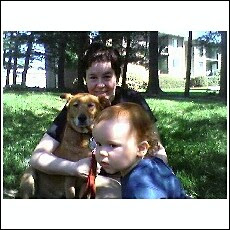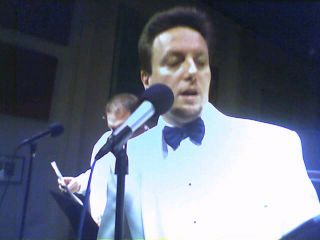- the opening line of "F For Fake" intoned by Orson Welles in darkness.
In 2005, I wrote a review of the Criterion dvd of the movie here, but this is a film that has become my favorite Welles film and I thought I would try a lengthier ("Is such a thing possible?" you say) essay on what makes "F For Fake" so unforgettable.
In 2005, I wrote a review of the Criterion dvd of the movie here, but this is a film that has become my favorite Welles film and I thought I would try a lengthier ("Is such a thing possible?" you say) essay on what makes "F For Fake" so unforgettable.
 For most of us who grew up in the seventies, when we think of Orson Welles, we think of him as he looks in this, his last completed film. A corpulent older man, full-flowing gray beard wearing black with a voice that has the resonance of the theatre-trained radio actor that he was (when he wasn't being a boy genius, a maverick, a has-been or any other perception of him in the biz). Rambling on about wine or peas or how it was in the forties when John Ford was still making Westerns, Welles would give you the idea of all of his former greatness having been diluted into the commercial pitchman and perennial talk show guest he became by the early seventies.
For most of us who grew up in the seventies, when we think of Orson Welles, we think of him as he looks in this, his last completed film. A corpulent older man, full-flowing gray beard wearing black with a voice that has the resonance of the theatre-trained radio actor that he was (when he wasn't being a boy genius, a maverick, a has-been or any other perception of him in the biz). Rambling on about wine or peas or how it was in the forties when John Ford was still making Westerns, Welles would give you the idea of all of his former greatness having been diluted into the commercial pitchman and perennial talk show guest he became by the early seventies.But, then, you were probably not aware of "F For Fake".
A film he made out of scraps of other's (including his own) uncompleted films, united by his narrated essay on how much fakery and art need each other, this film begins with a magic trick with children in a French train station. He makes a key turn into a coin, has dialogue with his film crew (including his cinematographer François Reichenbach, who directed an unfinished documentary that Welles uses as the basis for "F") and a mysterious woman (Oja Kodar, Welles' mistress/collaborator/muse at the time) who plays a larger part in the later section of the film. All of this chicanery is part of the larger magic trick of Welles drawing you into a film that is not a documentary, but, instead, the cinematic equivalent of having him over to your house for a dinner party.
 As I said before, this film's central theme is Welles' assertion that art and fakery are symbiotic and it is hard to tell where one ends and one begins. Indeed, he makes the case that perhaps the fakery is as authentic as the original. Using François Reichenbach's original footage we take a look at Elmyr de Hory's work as a forger of Picasso paintings. With Reichenbach's interviewer, author Clifford Irving (who wrote a book on de Hory), we see the charming little forger explain his work and host parties as the toast of the seventies European jet set. Does Irving sound familiar to you? Do you remember a Richard Gere film called "The Hoax"? It was based on Irving having, not much longer after Reichenbach's project, but before Welles', faked an autobiography of Howard Hughes. This book was protested by Hughes himself and eventually Irving was found out and sent to prison.
As I said before, this film's central theme is Welles' assertion that art and fakery are symbiotic and it is hard to tell where one ends and one begins. Indeed, he makes the case that perhaps the fakery is as authentic as the original. Using François Reichenbach's original footage we take a look at Elmyr de Hory's work as a forger of Picasso paintings. With Reichenbach's interviewer, author Clifford Irving (who wrote a book on de Hory), we see the charming little forger explain his work and host parties as the toast of the seventies European jet set. Does Irving sound familiar to you? Do you remember a Richard Gere film called "The Hoax"? It was based on Irving having, not much longer after Reichenbach's project, but before Welles', faked an autobiography of Howard Hughes. This book was protested by Hughes himself and eventually Irving was found out and sent to prison.And so Welles incorporates that as well, into the film.
 Then Welles brings up his own hoax, the panic that came from a broadcast of his radio version of H.G. Wells' "The War Of The Worlds". Although Welles didn't intentionally create a panic, his dramatization was so real, it made a number of listeners across the country listening to it believe America was being invaded by Martians. During this section he has his old friends Joseph Cotton and Paul Stewart comment on the phenomenon.
Then Welles brings up his own hoax, the panic that came from a broadcast of his radio version of H.G. Wells' "The War Of The Worlds". Although Welles didn't intentionally create a panic, his dramatization was so real, it made a number of listeners across the country listening to it believe America was being invaded by Martians. During this section he has his old friends Joseph Cotton and Paul Stewart comment on the phenomenon.And then he brings up his lady friend Kodar's relation to Picasso and some forgeries associated with that association.

The film begins with a magic trick and ends with a mild piece of flim-flammery, that to be fair, Welles told you was going to happen in his introduction in the film. Along the way we get several dinner parties, Oja Kodar running around in next to nothing (or nothing) at all (making one feel the letter "F" is not merely for "Fake), Laurence Harvey (and excerpts from a film Welles was trying to finish with Harvey in it), some more magic, beautiful architecture, and a film that ends as pleasantly mysterious as it began.
And as I think about the film, I find that it's not the ideas presented in it, but the atmosphere itself filled with fast cuts, Welles' soothing baritone, eccentric characters, Michel Legrand's ("The Shadow Of Your Smile", "Summer Of '42") great score and each section as sublime as the one that precedes it.
Like a great dinner party that you don't remember the specifics of, only how terrific an evening it was.






1 comment:
I don't understand how this constitutes an "essay". All you did was recount what is seen while watching the film, which is totally useless--both to people who have seen the film and those who haven't.
Post a Comment